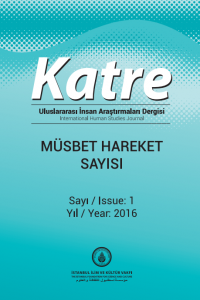Abstract
Communities who serve religion must establish good relations with each other and must act together at least some commons. This is because in the end it is not the result of one person’s effort but rather the mutual effort of everybody involved. This service is a product of everybody helping each other. It is also necessary for this service to be one of co-operation and solidarity. Communities should act compassionately to each other, to act with fondness towards their own work, to keep away from violence and force and instead use the method of persuasion, to be content with using verbal pleading against injustices, to be righteous and to create mutual alliances at least some commonalities. In addition those communities who expect courtesy, who regard other communities as false, who regard power as righteousness, who transform charity to become the means of worldly competition, who see the love of service in the form of greed and pride – such as weaknesses can be found in the community. These weaknesses can give rise to individuals who accuse each other of being unbelievers, to insult and scorn and criticize one another as well as foster envy. Religious communities firstly must not backbite each other, they must establish good relations amongst each other, and it is also required that they cautiously consider others and show deference to them while doing to their own services and actions. Pertaining to these problems; Bediuzzaman Said Nursi’s Risale-i Nur will be examined and conclusions will be drawn from it.
Keywords
References
- 2
Abstract
Din hizmeti yapmayı gaye edinmiş olan cemaatler birbirleriyle iyi münasebetler kurmak ve asgarî müştereklerde birlikte hareket etmek mecburiyetindedirler. Çünkü sonuca sadece birisinin çabasıyla değil, hepsinin ortak gayretiyle ulaşılacaktır. Bu hizmette herkes birbirinin yardımcısı hükmündedir. Ayrıca bu hizmet mahiyeti itibariyle de yardımlaşmayı ve dayanışmayı gerekli kılar. Cemaatler birbirlerine karşı merhametle davranmak, kendi mesleğinin muhabbetiyle hareket etmek, kaba kuvvet ve şiddetten uzak durmak, iknâ metodunu kullanmak, yapılan haksızlıklar karşısında sözlü müdafaa ile yetinmek, hakşinas olmak ve asgari müştereklerde ittifak etmek mecburiyetindedirler. Bununla birlikte cemaatlerde teveccüh-i nâs beklentisi içinde olmak, başka cemaatleri haksız telakkî etmek, güçlü olmayı haklılık sebebi saymak, cemaat istibdadı, hayırda yarışın dünyevî rekabete dönüşmesi, hizmet aşkının hırsa bürünmesi, Allah rızasını elde etme düşüncesinin ve âhiret inancının ittifakı zayıflatması gibi bazı sosyo-psikolojik zaaflar bulunabilir. Bu zaaflar cemaatlerin birbirlerini tekfir, techil, tahkir, tenkid ve haset etmelerine sebebiyet verebilir. Dini cemaatlerin önce birbirlerini kötülememeye, sonra aralarında iyi münasebetler kurmaya, daha sonra da bu meydanda başkalarının da bulunduğunu dikkate alarak kendi hizmetlerini yaparken ihtiyatlı olmaya özen göstermeleri gerekir. Konuyla ilgili problemler Bediüzzaman Said Nursî’nin Risale-i Nur Külliyatı esas alınarak incelenecek ve bir sonuca varılmaya çalışılacaktır.
References
- 2
Details
| Primary Language | Turkish |
|---|---|
| Journal Section | Refereed Articles |
| Authors | |
| Publication Date | March 1, 2016 |
| Submission Date | March 1, 2016 |
| Published in Issue | Year 2016 Issue: 1 |

Katre International Human Studies Journal is open access journal under the CC BY-NC license (Creative Commons Attribution 4.0 International License)
Based on a work at https://dergipark.org.tr/en/pub/katre
E-mail: katre@iikv.org

